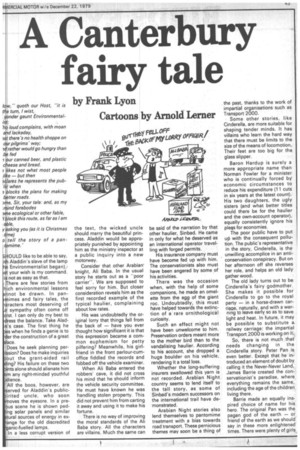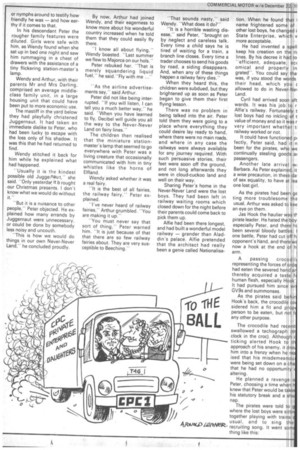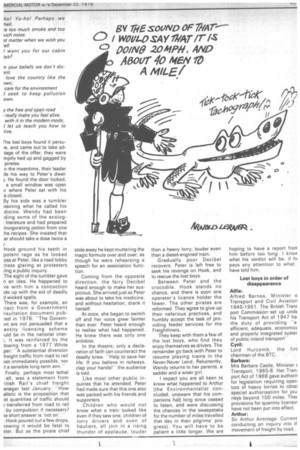A Canterbury fairy tale
Page 45

Page 46

Page 47

If you've noticed an error in this article please click here to report it so we can fix it.
by Frank Lyon
OULD like to be able to say, Aladdin's slave of the lamp Environmentalist began),■ your wish is my command. not as easy as that.
here are few stories from ch environmental lessons not be drawn. In panImes and fairy tales, the racters most deserving of sympathy often come off st. I can only do my best to ess the balance. Take Alads case. The first thing he s when he finds a genie is to er the construction of a great e.
oes he seek planning persion? Does he make inquiries ut the grant-aided rail ng? His failure on these two nts alone should alienate him any right-minded youthful ence.
ll the boos, however, are erved for Aladdin's publicrited uncle, who soon roves the eyesore. In a preus scene he is shown pedg solar panels and similar ural sources of energy in exnge for the old discredited anic-fuelled lamps.
In a less corrupt version of the text, the wicked uncle should marry the beautiful princess. Aladdin would be appropriately punished by appointing him as the ministry inspector at a public inquiry into a new motorway.
Consider that other Arabian' knight, Ali Baba. In the usual story he starts out as a -poor carrier-. We are supposed to feel sorry for him. But closer consideration reveals him as the first recorded example of the typical haulier, complaining about low rates.
His was undoubtedly the original lorry that things fell from the back of — have you ever .thought how significant it is that this expression became a common euphemism for petty pilfering? Meanwhile, his girlfriend in the front parlour-cumoffice fiddled the records and fobbed off the vehicle examiner.
When Ali Baba entered the robbers' cave, it did not cross his mind that he should inform the vehicle security committee. He must have known he was handling stolen property. This did not prevent him from carting it away and using it to make his fortune.
There is no way of improving the moral standards of the Ali Baba story. All the characters are villains. Much the same can be said of the narration by that other haulier, Sinbad. He came in only for what he deserved as an international operator travelling with forged permits.
His insurance company must have become fed up with him. The conservationists also must have been angered by some of his activities.
There was the occasion when, with the help of some companions, he made an omelette from the egg of the giant roc. Undoubtedly, this must have helped towards the extinction of a rare ornithological curiosity.
Such an effect might not have been unwelcome to him. Preservation orders meant more to the mother bird than to the vandalising haulier. According to his account, she dropped a huge boulder on his vehicle, rendering it a total loss.
Whether the long-suffering insurers swallowed this yarn is not recorded. Arabian Night country seems to lend itself to the tall story. as some of Sinbad's modern successors on the international trail have demonstrated.
Arabian Night stories also lend themselves to pantomime treatment with a bias towards road transport. These pernicious themes may soon be a thing of the past, thanks to the work of impartial organisations such as Transport 2000.
Some other stories, like Cinderella, are more suitable for shaping tender minds. It has villains who learn the hard way that there must be limits to the size of the means of locomotion. Their feet are too big for the glass slipper.
Baron Hardup is surely a more appropriate name than Norman Fowler for a minister who is continually forced by economic circumstances to reduce his expenditure (11 cuts in six years at the latest count). His two daughters, the ugly sisters (and what better titles could there be for the haulier and the own-account operator), equally consistently ignore his pleas for economies.
The poor public have to put uP with the consequent pollution. The public's representative in the story, Cinderella, is the unwilling accomplice in an anticonservation conspiracy. But on her afternoon off she reverses her role, and helps an old lady gather wood.
The old lady turns out to be Cinderella's fairy godmother. She makes it possible for Cinderella to go to the royal party — in a horse-drawn carriage, naturally, and with a warning to leave early so as to save light and heat. In future, it may be possible to substitute a railway carriage: the impartial Transport 2000 is working on it.
So, there is not much that needs changing in the Cinderella story. Peter Pan is even better. Except that he introduced an element of doubt by calling it the Never-Never Land, James Barrie created the conservationist's paradise, where everything remains the same, including the age of the children living there.
Barrie made an equally inspired choice of name for his hero. The original Pan was the pagan god of the earth — or friend of the earth as we should say in these more enlightened times. There were plenty of girls or nymphs around to testify how friendly he was — and how earthy if it comes to that.
In his descendant Peter the rougher family features were diluted. Girls were safe with him, as Wendy found when she sat up in bed one night and saw him rummaging in a chest of drawers with the assistance of a tiny flickering station-master's lamp.
Wendy and Arthur, with their parents Mr and Mrs Darling, comprised an average middleclass family unit, in a large housing unit that could have been put to more economic use.
The mastiff in the yard below they had playfully christened Juggernaut. It had taken an immediate dislike to Peter, who had been lucky to escape with the loss only of his shadow. It was this that he had returned to find.
Wendy stitched it back for him while he explained what had happened.
-Usually it is the kindest possible old Juggenaut," she said. "Only yesterdar if b rought our Christmas presents. I don't know what we would do without it.
"But it is a nuisance to other people," Peter objected. He explained how many errands by Juggernaut were unnecessary, or could be done by somebody less noisy and uncouth.
"This is how we would do things in our own Never-Never Land,he concluded proudly.
By now, Arthur had joined Wendy, and their eagerness to know more about his wonderful country increased when he told them that they could easily fly there.
-I know all about flying,Wendy boasted. "Last summer we flew to Majorca on our hols."
Peter rebuked her. "That is merely squandering liquid fuel," he said,' 'Fly with me "'As the airline advertisements say," said Arthur.
Peter did not like being interrupted. "If you will listen, I can tell you a much better way,he said. "When you have learned to fly, Decibel will guide you all the way to the Never-Never Land on fairy lines."
The children then realised that the miniature stationmaster's lamp that seemed to go everywhere with Peter was a living creature that occasionally communicated with him in tiny whistles like the horns of Elf land Wendy asked whether it was a real fairy.
"It is the best of all fairies, the railway fairy,Peter explained.
"I've never heard of railway fairies," Arthur grumbled. "You are making it up.
-You must never say that sort of thing,Peter warned him. "It is just because of that that there are so few railway fairies about. They are very susceptible to Beeching."
"That sounds nasty," said Wendy. "What does it do?"
"It is a horrible wasting disease," said Peter, "brought on by neglect and careless talk. Every time a child says he is tired of waiting for a train, a branch line closes. Every time a trader chooses to send his goods by road, a siding disappears. And, when any of these things happen a railway fairy d i es . "
When they heard this, the children were subdued, but they brightened up as soon as Peter began to give them their first flying lesson.
There was no problem in being talked into the air. Peter told them they were going to a place where everything they could desire lay ready to hand, where there were no main roads, and where in any case the railways were always available for any journey required. With such persuasive stories, their feet were soon off the ground, and not long afterwards they were in cloud-cuckoo land and well on their way.
Sharing Peter's home in the Never-Never Land were the lost boys. They had been left in railway waiting rooms which closed down for the night before their parents could come back to pick them up.
Alfie had been there longest, and had built a wonderful model railway — grander than Aladdin's palace. .Alfie pretended that the architect had really been a genie called Nationalisa
tion. When he found that 1 name frightened some of other lost boys, he changed i State Enterprise, which v more acceptable.
He had invented a spell keep his creation on the ri lines. By his decree it had to "'efficient, adequate, ecc omical and properly in grated-. You could say tha was, if you stood the words their head, which you allowed to do in Never-Ne, Land.
Cyril had arrived soon aft wards. It was his job to r Alfie's railway. Fortunately t lost boys had no inkling of t value of money and so it was r very important whether railway worked or not.
It could have functioned p■ fectly, Peter said, had it n been for the pirates, who we continually stealing goods al passengers.
Another late arrival w, Barbara. As Peter explained, it a wise precaution, in these da of sex equality, to have at lea one lost girl.
As the pirates had been gc ting more troublesome the usual, Arthur was asked to kee an eye on them.
Jas Hook the haulier was t} pirate leader. He hated the boy! especially Peter, and there N. been several bloody battles. one battle, Peter had cut off h opponent's hand, and there w now a hook at the end of h arm.
A passing crocodil representing the forces of ord had eaten the severed hand a thereby acquired a taste f human flesh, especially Hook' It had pursued him since wi GV9s and summonses.
As the pirates said behi Hook's back, the crocodile co sidered him a fit and prop person to be eaten, but not f any other purpose.
The crocodile had recent swallowed a tachograph (t clock in the croc). Although ticking alerted Hook to t approach of his enemy, it dro him into a frenzy when he re ised that his misdemeanou were being set down on a cha that he had no opportunity altering.
He planned a revenge Peter, choosing a time when knew that Peter would be taki his statutory break and a sho nap.
The pirates were told to where the lost boys were sittin together playing with trains usual, and to sing the recruiting song. It went som thing like this: rhe lost boys found it persure, and came out to take adtage of the offer; they were mptly tied up and gagged by pirates.
n the meantime, their leader de his way to Peter's dwelj. He found the door locked, a small window was open ir where Peter sat with his is closed.
By his side was a tumbler itaining what he called his dicine. Wendy had been iding some of the ecolog1 literature and had prepared invigorating potion from one the recipes. She insisted that :er should take a dose twice a
Hook ground his teeth in potent rage as he looked oss at Peter, like a road lobby mess glaring at protesters ring a public inquiry.
The sight of the tumbler gave n an idea. He happened to ve with him a concoction ide up with the aid of deadly d wicked spells.
There was, for example, an tract from a Government nsultation document pub-red in 1976: "The Governint are not persuaded that a entity licensing scheme iuld be in the national intert. It was reinforced by the lowing from a 1 977 White per: "A substantial diversion freight traffic from road to rail not immediately possible, nor it a sensible long-term aim.' Finally, perhaps most lethal all, was a statement from -itish Rail's chief freight anager last January: "How alistic is the proposition that 1St quantities of traffic should ) transferred from road to rail by compulsion if necessary? le short answer is 'not on"... Hook poured out a few drops, lowing it would be fatal to ater. But as the pirate chief
stole away he kept muttering the magic formula over and over, as though he were rehearsing a speech for an association function.
Coming from the opposite direction, the fairy Decibel heard enough to make her suspicious. She arrived just as Peter was about to take his medicine, and without hesitation, drank it herself, At once, she began to switch off and her voice grew fainter than ever. Peter heard enough to realise what had happened. He knew there was only one antidote.
In the theatre, only a declaration of faith can counteract the deadly brew. "Help to save her life. If you believe in railways, clap your hands!'" the audience is told.
Like most other public inquiries that he attended, Peter had made sure that this one also was packed with his friends and supporters.
Children who would not know what a train looked like even if they saw one, children of lorry drivers and even of hauliers, all join in a rising thunder of applause, louder than a heavy lorry, louder even than a diesel-engined train.
Gradually poor Decibel recovers. Peter is left free to seek his revenge on Hook, and to rescue the lost boys.
Between Peter and the crocodile, Hook stands no chance, and there is soon one operator's licence holder the fewer. The other pirates are reformed. They agree to give up their nefarious practices, and humbly accept the task of providing feeder services for the Freightliners.
They keep with them a few of the lost boys, who find they enjoy themselves as drivers. The remainder go back with Peter to resume playing trains in the Never-Never Land. Reluctantly, Wendy returns to her parents, a sadder and a wiser girl.
I expect you are all keen to know what happened to Arthur (the Environmentalist concluded, unaware that his companions had long since ceased to listen, and were discussing the chances in the sweepstake for the number of miles travelled that day in their pilgrims' progress). You will have to be patient a little longer. We are hoping to have a report frorr him before too long. I knov what his verdict will be, if hi pays any attention to what have told him.
Lost boys in order of disappearance Alfie: Alfred Barnes, Minister o Transport and Civil Aviation 1945-1951. The British Trans port Commission set up undE his Transport Act of 1947 ha the duty of providing "a efficient, adequate, economici and properly integrated syster of public inland transport" Lord Hurcomb, the firs chairman of the BTC.
Barbara: Mrs Barbara Castle, Minister ( Transport, 1965-8. Her Trani port Act of 1968 gave authorii for legislation requiring open tors of heavy lorries to obtai special authorisation for jou neys beyond 100 miles. Thee provisions for quantity licensin have not been put into effect. Arthur: Sir Arthur Armitage. Current conducting an inquiry into tf movement of freight by road,




















































































